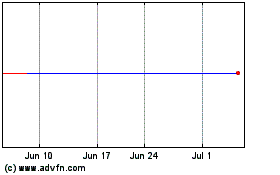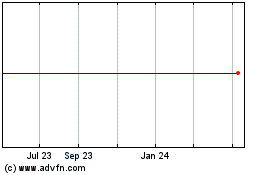2nd UPDATE:Senators, White House Reach Deal On Media-Shield Bill
October 30 2009 - 5:15PM
Dow Jones News
The White House reached a compromise with lawmakers Friday on
legislation that would protect journalists in some circumstances
from being ordered to reveal their confidential sources.
U.S. Sens. Charles Schumer (D., N.Y.) and Arlen Specter (D.,
Pa.), sponsors of the legislation, said the compromise includes new
provisions that further protect national security interests, which
had been a concern for the Obama administration.
Specter said the White House played a "decisive role" in working
out the compromise. He said the bill is "a major improvement over
current procedures where journalists have been threatened, fined
and jailed for appropriately protecting sources."
White House spokesman Ben LaBolt said the Obama administration
is the first in history to support media-shield legislation.
"We expect this proposal to move forward with bipartisan
support, and the president looks forward to signing it into law,"
LaBolt said.
The bill provides that, in cases of leaked classified
information, a reporter isn't protected from revealing confidential
sources when the information would help the government prevent or
mitigate an act of terrorism or other acts that would significantly
harm national security.
An earlier version of the bill would have allowed federal judges
to balance the public's interest in newsgathering against the
government's interest in protecting national security.
In cases that don't involve national-security threats, the bill
instructs that a reporter can legally protect a source if a federal
judge, after weighing several factors, finds that ordering the
reporter to reveal the source would harm the public's interest in
the free flow of news and information.
Lucy Dalglish, the executive director of The Reporters Committee
for Freedom of the Press and a participant in the legislative
negotiations, said the compromise was a solid one.
Dalglish said the national security exemption wasn't as broad as
the White House was seeking and only applies in cases where the
leaking of information implicates a future threat to security.
The legislation places a high legal burden on reporters seeking
to protect sources, especially in criminal cases, "but right now we
have nothing," she said. "This gives us a chance to show why it's
important to protect a source."
Dalglish said the law likely would have aided reporters at the
San Francisco Chronicle who were threatened with jail time for not
revealing their sources in the Bay Area Laboratory Co-operative, or
Balco, steroids scandal that implicated several star athletes.
Dalglish said she wasn't sure whether the bill would have
protected former New York Times reporter Judith Miller, who went to
prison for refusing to reveal her source in the Valerie Plame leak
affair.
Schumer said the compromise would allow the bill to move more
quickly through the Senate Judiciary Committee and the full
Senate.
The House passed a version of the legislation in March. More
than 70 media organizations have endorsed the legislation,
including News Corp. (NWS, NWSA), which owns Dow Jones & Co.,
the publisher of this newswire.
-By Brent Kendall, Dow Jones Newswires; 202-862-9222;
brent.kendall@dowjones.com
Harris (NYSE:HRS)
Historical Stock Chart
From May 2024 to Jun 2024

Harris (NYSE:HRS)
Historical Stock Chart
From Jun 2023 to Jun 2024
